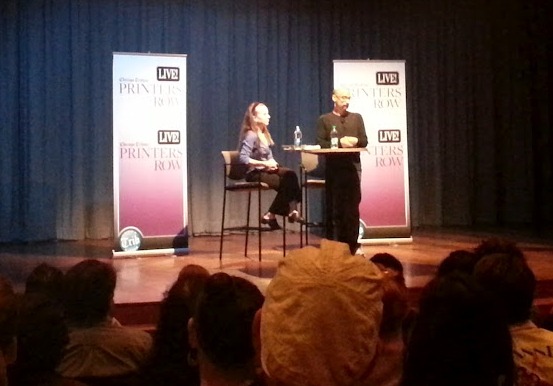I had the chance to see Pulitzer Prize-winning author Junot Diaz speak live last night and it was a great experience to meet another author I really admire. Although most of the topics Diaz discussed were pretty heavy, he was also humorous and overall I found him to be really intelligent and thoughtful.
Plus, the moderator was Mary Schmich, a Pulitzer Prize-winning columnist from the Trib, who I learned wrote that famous “Wear Sunscreen” speech.
The Immigration Story
Diaz talked about how aware he was of the patterns and ruptures in his family after immigrating to the U.S. from the Dominican Republic. Attitudes and roles that maybe weren’t as apparent back “home” all of a sudden seemed very pronounced here.
And did you know that those Richard Scarry illustrated children’s books were Diaz’s first introduction to things like fire departments and police? It was a jarring perspective. Imagine coming from the Dominican Republic with no exposure to those types of institutions and no frame of reference. How helpful a simple book showing typical American “slice of life” scenes must be.
Diaz also observed how the worst place to grow up in America is in a community of people who are discriminated against. How there’s so much pain in those communities, they pass that pain along to anyone they can, the first chance they get. I thought that was a very accurate and sad statement.
The Mystery of Men’s Subjectivity
One really interesting topic Diaz discussed was how there was no accurate representation of boys’ subjectivity in art. Meaning that we have little knowledge of the interiority of boys’ minds – how they actually, really think. He felt that all written or visual or performance art that tried to breach the subject was censured and not on point with how men really think.
He went on to explain that this is because boys are just unused to even describing in words their thoughts and feelings. It’s a social norm for these things to be off limits and repressed in boys. Furthermore, Diaz ventured that men’s privilege in society comes from this silence and from not thinking about their own subjectivity. It was an interesting discussion.
But my favorite part was when Diaz reflected on just how much pity boys have for themselves. Amen!
Get Over the Sex
Apparently you can’t read Diaz’s work without commenting on the sex/sexual scenes it contains. But he made a really valid point – of all the horrible and depressing and dysfunctional situations he describes in his work, people can look past all that, but they can’t get over the sex. Which, let’s face it, is just accurately portraying what people do in life.
At the same time, he commented on how this is a somewhat intentional approach to his writing. A method of misdirection. Because when you get people to focus on something like that, you’re free to explore the real issues (of race, of gender, of rape) and provoke conversations without sounding preachy.
Kids These Days
You can’t have a writer like Diaz come to Chicago during a teachers’ strike without broaching the topic of arts education (or lack thereof). When one girl asked Diaz if he felt that by showing a character like Yunior, who is “perversely honest about the world” (Diaz’s description), he was perpetuating those behaviors or forcing people to react to them, the author brought up a good point of “representation vs. approbation.” Meaning, that through their education, kids should be taught the difference between representing a character or behavior versus approving of it. And I can’t help but wonder/worry if in today’s schools kids are truly being taught that difference and understand it.
One more point about education. Diaz talked about how when he was in school, although he went to public school, there wasn’t that much disparity between his education and that of kids in private school. However, today, the gap is huge. I guess I went to school somewhere between his time and this time, but I can relate to that disparity. At a certain point I realized that I was just not in the same world as kids who went to private school and went to Harvard. Don’t get me wrong, I’m pretty damn smart, if I do say so myself, but there’s certainly a huge division between the two worlds.
Overall, it was a really thought-provoking discussion. Damn, that Diaz is smart. I’ll wrap up by sharing this insight he shared that really stuck with me:
“When you face the broken parts of yourself,
you end up either living in the cracks or writing a new story for yourself”


Traffic is the key to my website business. I found a company that has been an amazing resource in building our traffic and the communication back and forth has been great. I use most of the services offered by this company and I am now getting hundreds of targeted visitors to my website every day. Take a look here: http://2hams.com/2611h